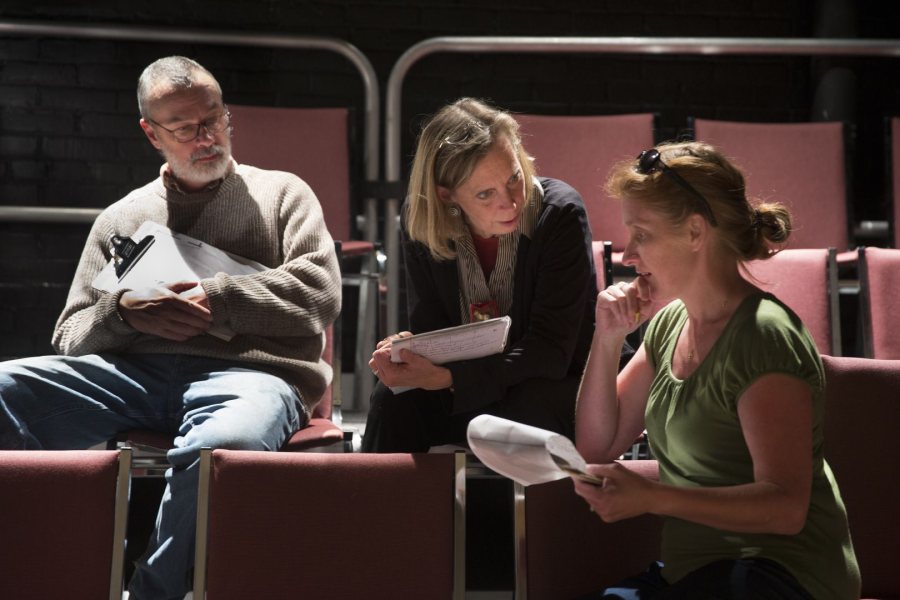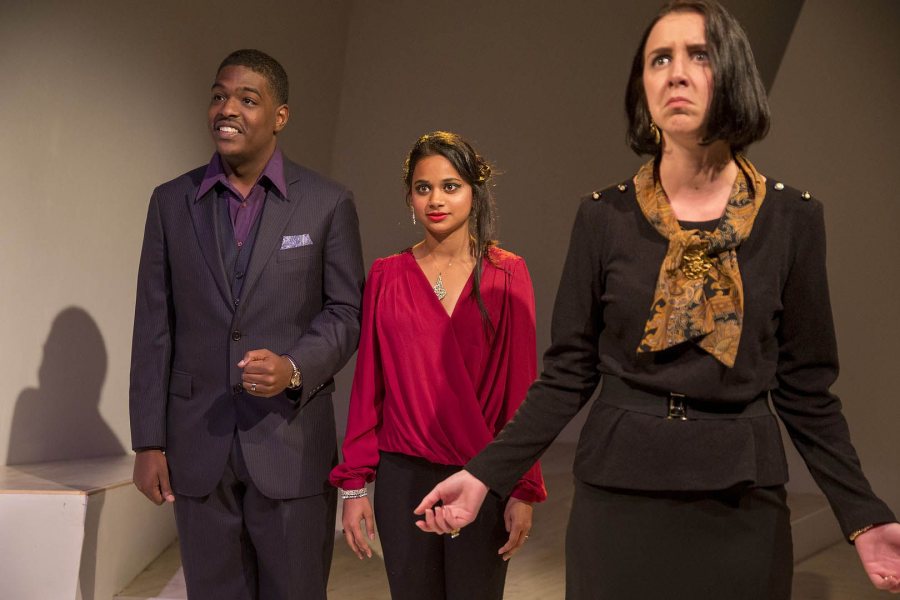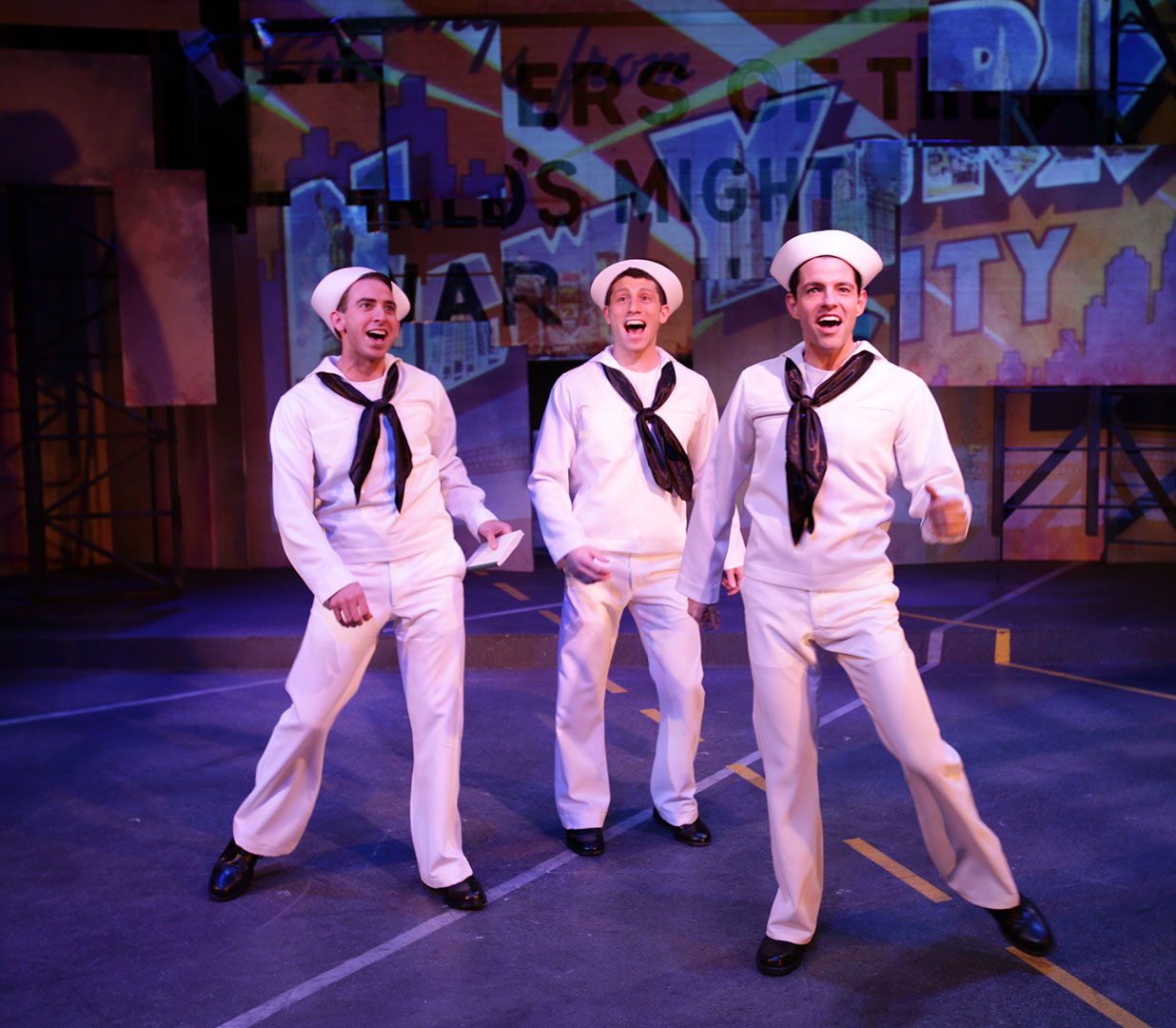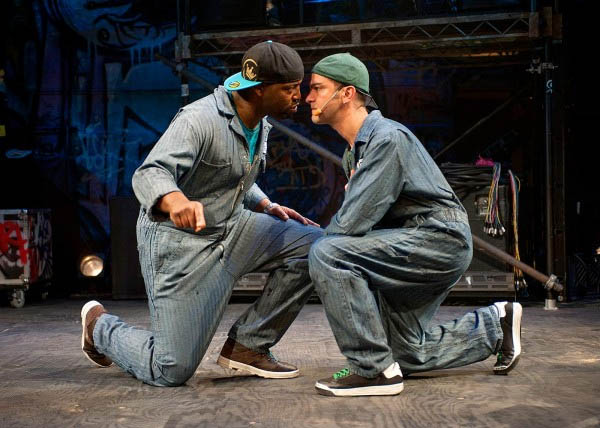
Q&A: Director Sally Wood discusses the Bates theater opener, ‘Tomorrow in the Battle’
An acclaimed and unusual play based on a standard-issue plot engine, the love triangle, opens the mainstage theater season at Bates on Oct. 6.
Visiting Assistant Professor of Theater Sally Wood directs a cast of three in Kieron Barry’s Tomorrow in the Battle — a play that uses surprising dramatic means to explore decision, power, and desire, and how those human energies break the walls between what’s public and what’s private.
In the Bates production, the character of Anna is played by Christina Felonis ’17 of Athens, Greece; Simon is played by Brennen Malone ’17 of Philadelphia; and Sukanya Shukla ’20 of Gwalior, India, is Jennifer.
Here’s what Wood has to say about Tomorrow in the Battle.
Who’s the threesome in this love triangle?
It’s your typical triangle — a husband, a wife, and a mistress. Simon, the husband, is a world-famous heart surgeon. So he’s got this incredible career going for him. His wife, Anna, works for the Ministry of Defence in England in a very important, quite consequential job. And Jennifer, who becomes the mistress, is basically the public face of a financial firm.
Where does the playwright take the standard love triangle setup?
I’ve never been around a play like this: The characters speak almost exclusively in monologue to the audience. So it’s like you have these three projectiles that cross paths. On paper, you’d think it would never work. But their stories are so compelling that it draws you in.
On a deeper level, what’s the play about?
Chance. There are a lot of chance meetings — “Anna was delayed, which is why I went to the opera alone, that’s where I met Jennifer.” And through those, people make choices.
At different points in the play each character makes a simple decision that escalates into something much, much, much larger. Those choices balloon up — you know, not just impacting their own lives but impacting the lives of 30,000 people or perhaps the world at large.
What makes the play and this production a good learning experience for the student actors?
For one thing, it’s such a tight production schedule, I’m asking so much of them so quickly. The beauty of that is that you have to jump on your first instinct. That forces them to be bold, forces them to just trust that whatever they’ve got is enough. Sometimes, if we wait for the perfect moment we’ll spend our whole lives trying to get there.

Director Sally Wood (right) discusses a creative point with costume designer Carol Farrell and set and lighting designer Michael Reidy. (Phyllis Graber Jensen/Bates College)
Two of the students knew this summer that they would be doing this play. For Brennen, this play is a thesis project, and for Christina it’s preparation for thesis next semester. They had about five of their monologues memorized coming in.
But Sukanya, who is amazing, is a first-year who got cast the first day of classes. For her it was like, “Welcome to Bates, here’s your script and let’s get going.” And it’s been wonderful seeing her just jump in.
The play is intended for an adult audience. How do you guide young actors in conveying these themes?
I feel that we all have the capacity to understand pretty much any situation. True, the freshman coming in may not have had an extramarital affair, you know. But we’ve all had questionable moments in our lives when we didn’t do the right thing or we would have made a different decision.
Monologues, I tell my students all the time, are the hardest thing to do in theater.
It’s just telling the students, “Look, things don’t actually change all that much as we get older. Maybe the consequences get larger, so we become more responsible for those initial choices that we make.”
And they’re very much into the politics of the play itself. It’s really fun watching them have to advocate for their characters.
What are the challenges and gratifications of directing Tomorrow in the Battle?
The biggest challenge is that it’s three monologues, basically, and that’s really difficult. Monologues, I tell my students all the time, are the hardest thing to do in theater, because it’s just you out there. You have to form a relationship with the audience.
As for gratifications: We had a great rehearsal last night where things really started to pop. And I could see the light bulbs going off, including in my own head — I was like, “Oh, yes, yes, yes. Okay, now I see the path.” Which is always an exciting moment — because you don’t know if the light bulbs are actually going to go off sometimes. So it’s comforting when they do.
Why should someone come see this play?
People should come and see all theater. But I think that this play will surprise them — it will absolutely get them to think about life and their own lives in a different way. I find myself implicated in this play, because I go back and think about choices that I’ve made or I’m going to make. And if a play can do that, that’s remarkable.





